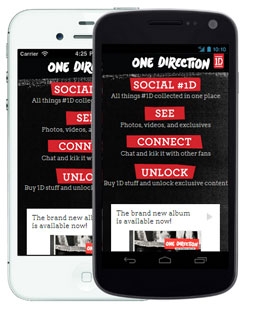
Get your FREE 30-day trial.
Please complete all fields.
Last week IPG Media Lab released a new report on messaging apps and how brands are experimenting with marketing campaigns on these new platforms.
Facebook's acquisition of WhatsApp for $19 billion brought significant coverage for the mobile messaging app industry as a whole. Ever since, brands and marketers have been asking what value these new apps and platforms could have for marketing purposes.
IPG's whitepaper explores their predictions for the future of app messaging and gives some case study examples and best practices for brands to understand how to utilize these new platforms.
Below are a few of the major messaging platforms and how brands have already begun to use each platform:
 Kik
Kik
The IPG Media Lab launched their own campaign on Kik with One Direction to build an exclusive user community for One Direction fans using Kik cards. They created an exclusive community where fans could chat and connect while encouraging purchases with exclusive rewards.
Line
The Japanese messaging app giant, Line, offers a vast array of voice, messaging, and gaming services for its users. Paul McCartney has started to experiment with Line's popular "stickers," releasing eight exclusive stickers for sale on the platform through his Line account.
Snapchat
Snapchat has gained quite a bit more popularity and press here in the United States with its limited-time "Snaps." A few brands have already started to experiment with Snapchat. The Philadelphia Eagles used Snapchat to send behind-the-scenes photos and videos and release announcements and news to fans.
WeChat
WeChat, which is largely used in China, is being used in numerous ways by major brands. After partnering with mobile payments provider Tenpay to allow users to make purchases within the app, McDonald's used this partnership to offer discounts on items purchased upfront through the app.
McDonald's also has launched campaigns using WeChat's voice capabilities. They launched a contest asking users to record and submit a "Big Mac Rap" in the style of a Chinese TV personality.
PepsiCo has also used WeChat's voice capabilities to launch similar campaigns.
One of the key differences for marketers beginning to use messaging apps in their marketing programs will be the private nature of these apps. The essence of these apps is built around private messaging. Brands must keep in mind this conversational and personal nature of these apps.
These mobile messaging apps began as a way to avoid texting charges by distributing messages over IP, but these apps have become much more than simply an alternative to SMS. Many analysts in the industry believe a much larger trend is arising as these messaging apps are becoming major platforms in and of themselves. In-line messaging will soon be an integral part of brands' mobile marketing campaigns.